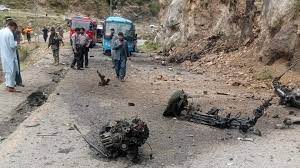Kathmandu: The attack comes amid a spate of terror attacks in Pakistan, as the country’s faltering ties to the Taliban affect regional security.
At least five Chinese workers were killed on Tuesday when a suicide bomber rammed a vehicle into their convoy in northern Pakistan, officials said. Their Pakistani driver was also killed in the attack.
There was no immediate claim of responsibility.
The Chinese laborers were working on the Dasu Dam, a hydropower project on the Indus River in the northwestern province of Khyber Pakhtunkhwa. Officials said the convoy was moving from Islamabad to Dasu and came under attack around 1 p.m.
This was the second-deadliest attack on Chinese working on the project, after a previous suicide attack on a convoy in 2021.
Pakistan and China have close economic and strategic ties. China is estimated to have spent some $62 billion on those projects in Pakistan, mostly to build a transportation corridor through Baluchistan to a new Chinese-operated deepwater port in the Pakistani town of Gwadar.
“This latest attack on Chinese nationals in Pakistan heightens growing fears in Beijing about the bleak future of its tens of billions in investments in the country,” said Kamran Bokhari, a senior director of Eurasian security and prosperity at the New Lines Institute in Washington.
“China has had a front-row seat in witnessing Pakistan’s social, political, economic and security meltdown,” he said. “What is happening in Pakistan, along with the situation in post-U.S. Afghanistan, represents a serious threat to Chinese interests in the broader South and Central Asian regions.”
There has been a spike in terror attacks in Pakistan in recent days, signaling the grim security situation in the country, which is reeling from both political and economic crises and growing tensions with neighboring Afghanistan. Relations between Pakistan and Afghanistan have soured since a Pakistani decision last year to deport undocumented foreign nationals, mostly Afghans.
Earlier this month, Pakistan also bombed Pakistani Taliban targets inside Afghanistan.
On Monday night, Baluch separatists attacked a Pakistani naval base, P.N.S. Siddique, in the Turbat district. The Pakistan military said that four heavily armed attackers had been unable to breach security and were killed at the outer boundary of the base. Two Pakistani soldiers were killed in the firefight. The Baluchistan Liberation Army claimed responsibility for the attack.
Earlier, on March 20, two Pakistani soldiers were killed when Baluch separatists attacked Pakistani military intelligence offices in Gwadar, the southwestern city where Pakistan is developing a port with the help of China. Eight heavily gunmen tried to enter the Gwadar Port Authority and were killed after a firefight that lasted several hours, officials said.
Analysts said the attacks pointed to big internal security failures and regional tensions.
“The surge in violence is linked to Pakistan’s deteriorating ties with the Taliban,” Abdul Basit, a research fellow at the S. Rajaratnam School of International Studies, Singapore, said. “The new wave of violence also points to improving operational capabilities of both jihadists and Baloch separatist groups to hit hard targets in coordinated attacks. Both groups are employing suicide bombers, which underscores steady recruitment into their ranks,” he said.
In a statement, the Chinese Embassy in Islamabad said it “strongly condemns this terrorist act, expresses deep condolences for the victims in both countries and extends sincere condolences to the relatives of the victims. The embassy is working with Pakistan to carry out the handling after the incident fully.”




COMMENTS